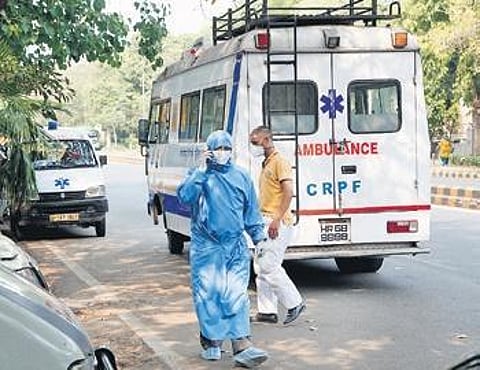

NEW DELHI: The COVID-19 outbreak and the subsequent lockdown have caused expected disruptions in providing routine health care services. In particular, it may also impact India’s elimination targets for diseases such as Tuberculosis (TB), Kala-Azar, and Lymphatic Filariasis.
One example of TB services being affected is that the notification of TB cases have taken a hit – from an average of around 43,500 new infections being reported to the government in the first week of January 2020, it has fallen to around 9,500 cases in April first week. One of the reasons for this could be limited access to healthcare facilities due to the lockdown.
“Several cases have been reported that TB patients are being turned away from hospitals. There are mixed reactions... access is difficult due to the ongoing pandemic thus diagnosis services are affected,” director and trustee of The Foundation for Medical Research, Mumbai, Dr Nerges Mistry told this newspaper.
Mistry said even though guidelines have been provided by the WHO, there was a requirement of practical guidelines on the ground as many health workers are apprehensive about what is reaching them.
“The voices from the ground are of apprehension among health workers which could be sorted by assuring them with proper safety PPE equipment’s,” Mistry added.
While for TB, the elimination guideline is 2025, for Kala-Azar and Lymphatic Filariasis, it is 2020 and 2021 respectively.
Experts said that a new paradigm must be created to address the prevailing challenges in disease elimination. However, the greater challenge is for a disease like Kala-Azar where the treatment is provided only under hospitalization.
Former DG ICMR, Prof Nirmal K. Ganguly underlined that a network of vaccinators need to be created for immunisation in India and sent with Protective gear to and the appropriate cold chain for vaccines to all the areas where children need it.
“We will have to find new method to deliver the vaccines to children. At this time, we have data so we can send the vaccinators to a particular areas we will have to include RMP and see those who can do it at private sector while streamline the vaccine for poor people. A mass campaign is needed as migration will be a problem ,” Ganguly said.
“Apart from the vaccination program the current situation has had a profound impact on Neglected Tropical Diseases (NTDs) which as the name suggests are already neglected for funds and focus. Three of the most important NTD elimination programs include Kala Azar Elimination Program (Indoor Residual Spray for vector control has been delayed in the remaining endemic areas), Accelerated Elimination of Lymphatic Filariasis (Mass drug administration in Bihar and Jharkhand has been postponed) and the program for control and elimination of Soil Transmitted Helminths (Deworming activities have been affected across several states),” Ganguly added further.
TB notifs take a hit
Notification of Tuberculosis (TB) cases have taken a hit – from an average of around 43,500 new infections being reported to the government in the first week of January 2020, it has fallen to around 9,500 cases in April first week.